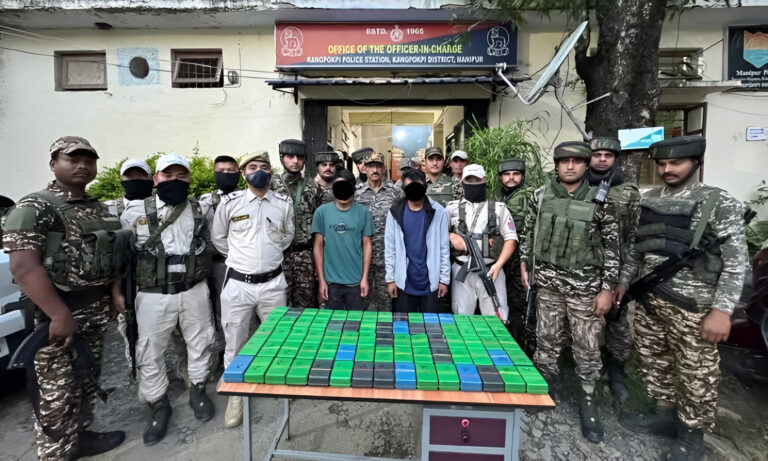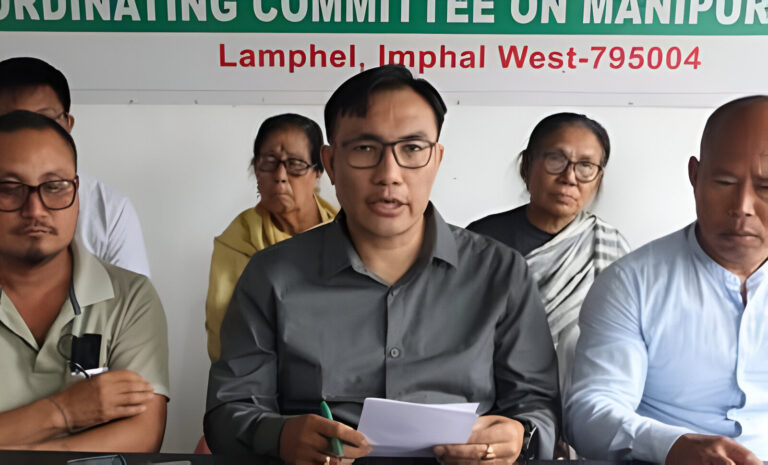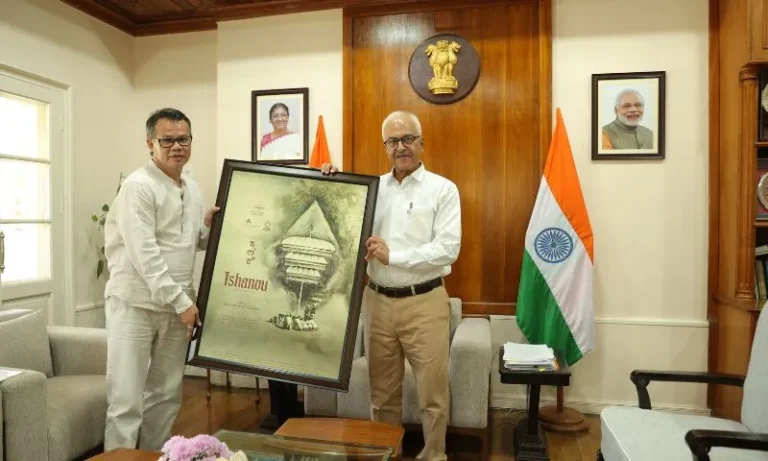Why Manipur Governor is Not Summoning the Assembly for Constitutionally Mandated Session: Congress’s Perspective and Implications
Summary
In a move that has sparked intense debate and raised constitutional questions, the Manipur Governor has refrained from summoning the State Assembly for its constitutionally mandated session. This decision, which has drawn sharp criticism from the Congress party, is being seen as a deviation from the expected democratic process. The controversy touches on the roles of constitutional mandates, the responsibilities of the governor, and the broader implications for democratic governance in Manipur. As Congress voices its dissent, the issue has ignited discussions on political accountability and the balance of power between state institutions.
In-Depth Article
Introduction
Have you ever wondered what happens when the expected norms of governance are disrupted by decisions that seem to fly in the face of constitutional mandates? In Manipur, a state with a rich democratic legacy and vibrant political discourse, the recent decision by the Governor not to summon the Assembly for a constitutionally mandated session has left many scratching their heads. This controversy, fueled by strong reactions from the Congress party, raises significant questions about the roles and responsibilities of state institutions and the impact such decisions can have on democratic processes.
In this article, we’ll take you through a detailed exploration of this decision. We’ll unpack the constitutional requirements that dictate such sessions, delve into the Governor’s powers and responsibilities, and examine why Congress has taken a stand against this decision. Whether you’re a political enthusiast or simply curious about how governance works in Manipur, join me as we break down this complex issue in simple, engaging language.
Understanding the Constitutional Mandate
To begin with, let’s clarify what a constitutionally mandated session of the Assembly entails. In any democratic system, the legislature plays a critical role in shaping policy, scrutinizing the government, and representing the people’s interests. In India, the Constitution lays down clear guidelines for when and how the State Assembly should convene. These sessions are not mere formalities—they are essential for ensuring that governance remains transparent, accountable, and responsive to the public.
Imagine the Assembly as the heartbeat of democracy in Manipur. Just as a heart must beat regularly to sustain life, the Assembly must meet periodically to keep the democratic process alive. When these sessions are not held as required, it can lead to a stagnation of political discourse and a breakdown in the system of checks and balances that is so vital in a vibrant democracy.
The Role of the Governor in Manipur
The Governor of a state in India holds a unique and often complex position. On one hand, the Governor is the representative of the President of India, tasked with upholding the constitutional framework. On the other hand, the Governor is expected to act impartially and support the democratic process, including ensuring that the State Assembly meets as required by law.
However, the powers vested in the Governor can sometimes be the subject of intense debate. Critics argue that when a Governor chooses not to summon the Assembly, it may appear as if they are overstepping their mandate or even engaging in political maneuvering. This is precisely the crux of the current controversy in Manipur.
The Congress party has voiced its concern, asserting that the Governor’s decision not to call the session undermines the democratic process. They argue that such a decision not only disrupts the functioning of the Assembly but also diminishes the accountability of the state government to its people. Essentially, it’s as if the conductor of an orchestra decides not to start the performance, leaving the musicians (in this case, the elected representatives) in a state of limbo.
Congress’s Perspective: A Call for Democratic Accountability
The Congress party, known for its long-standing tradition of advocating for democratic norms, has been vocal about its opposition to the Governor’s decision. According to Congress leaders, the failure to summon the Assembly for its mandated session is not just a procedural oversight—it is a fundamental violation of the democratic principles that form the backbone of governance in India.
Congress critics contend that this decision effectively sidelines the voices of the elected representatives, who are supposed to be the voice of the people. By not convening the Assembly, the state government loses an essential platform for debate, discussion, and decision-making. This, in turn, can lead to a scenario where executive decisions are made without adequate legislative scrutiny, thereby weakening the system of checks and balances.
Imagine trying to steer a ship without consulting the navigator or the crew—it’s a risky proposition that can lead to disaster. In the same way, bypassing the Assembly’s role in governance can have long-lasting negative impacts on the state’s democratic health. Congress believes that the Governor’s decision is a step in the wrong direction, one that could set a dangerous precedent for future governance in Manipur.
Possible Reasons Behind the Governor’s Decision
While the Congress party and its supporters are quick to criticize the decision, it is also essential to consider the possible reasons behind it. Political decisions are rarely black and white, and there might be multiple factors influencing the Governor’s actions.
One possible explanation could be related to the current political dynamics in the state. In some instances, a Governor may choose to delay or cancel an Assembly session if there are concerns about the stability of the state government or ongoing political turmoil. Could it be that there are behind-the-scenes issues that have prompted this decision? Or is it a calculated move to maintain a status quo that benefits certain interests?
Another angle to consider is the administrative challenges that might be at play. The logistical and operational aspects of convening a full Assembly session can be complex, especially in regions where political and social tensions are high. While these reasons may not justify the decision, they could provide context for understanding why the Governor might have chosen this course of action.
However, regardless of the rationale, the outcome remains the same: the Assembly, which is meant to be the forum for democratic deliberation, has been deprived of its opportunity to perform its vital functions. This has understandably led to frustration and criticism from various political quarters, particularly from those who see it as a disregard for the will of the people.
Implications for the Democratic Process in Manipur
The decision not to summon the Assembly has far-reaching implications for the democratic process in Manipur. At its core, democracy is about participation, representation, and accountability. When the mechanisms of democracy are circumvented, even temporarily, it can have a cascading effect on public trust and the overall functioning of government.
Consider the Assembly session as a town hall meeting where every voice matters. When that meeting is canceled or delayed, it sends a message that certain voices might be ignored. For the people of Manipur, this can lead to a growing sense of disenfranchisement and a belief that their elected representatives are being sidelined by bureaucratic or political maneuvering.
Furthermore, such a decision may embolden those who are critical of the current government to push for more radical changes, arguing that the democratic process is fundamentally broken. It can also serve as a precedent for future actions where the constitutional mandates are ignored under the guise of administrative convenience. In essence, it’s like removing the guardrails from a winding mountain road—the risk of accidents (or in this case, democratic erosion) increases significantly.
Comparative Analysis: How Do Other States Handle Similar Situations?
To put the situation in Manipur into perspective, it’s helpful to look at how similar cases have been handled in other states. In several instances across India, when controversies have arisen over the summoning of legislative sessions, the responses have varied widely. Some governors have adhered strictly to constitutional mandates, ensuring that the Assembly meets at the designated times regardless of political pressure, while others have exercised their discretion in ways that have sparked debate.
For example, in states where political instability is high, governors have sometimes delayed sessions to allow for a smoother transition of power or to prevent further escalation of conflicts. However, these decisions are often met with fierce criticism from opposition parties and civil society, who argue that they undermine the democratic process.
The key takeaway from these comparative insights is that there is no one-size-fits-all solution. The role of the Governor, while defined by the Constitution, often involves a degree of discretion that can lead to divergent interpretations and actions. What remains constant, however, is the expectation that the democratic process should not be compromised, and that elected representatives must be given their due role in governance.
Legal and Constitutional Perspectives
From a legal standpoint, the question of whether the Governor’s decision violates constitutional mandates is a subject of intense debate. The Constitution of India clearly outlines the responsibilities of the state legislature and the conditions under which it should convene. When these conditions are not met, it raises serious questions about the adherence to constitutional norms.
Legal experts argue that the Governor’s decision not to summon the Assembly could be challenged in court if it is found to be in direct violation of constitutional requirements. Such a challenge could set a legal precedent, reinforcing the principle that the rights of elected representatives and the mandates of the Constitution must be upheld, regardless of political or administrative pressures.
Think of the Constitution as the rulebook for a game of cricket—no matter how influential or powerful the players might be, the rules remain the same and must be followed to ensure a fair game. In the context of Manipur, any deviation from these established rules could lead to a breakdown in the democratic process and erode public trust in the system.
Reactions from Political Leaders and the Public
The reaction to the Governor’s decision has been swift and vocal. Political leaders, particularly from the Congress party, have criticized the move, accusing the Governor of undermining democratic values and neglecting the mandate of the people. Public opinion, as reflected in community discussions and on social media, echoes this sentiment—there is a palpable sense of frustration and concern over the future of democratic governance in the state.
One Congress leader remarked, “Our constitution is not optional—it is the backbone of our democracy. The failure to summon the Assembly is a clear deviation from the principles we hold dear.” Such statements underscore the belief that the Governor’s actions are not merely administrative decisions but have deep political and social ramifications.
At the same time, some supporters of the Governor’s decision argue that there may be compelling reasons behind the delay. They point to the complex political dynamics in the state and suggest that the decision might be intended to prevent further discord or instability. However, these views are often met with skepticism by those who believe that any deviation from constitutional norms sets a dangerous precedent.
The Impact on Governance and Policy-Making
When the Assembly does not convene, the implications extend beyond political rhetoric—they directly affect governance and policy-making. Legislative sessions are the platform where policies are debated, scrutinized, and formulated. Without these sessions, critical decisions may be delayed, and the accountability of the executive branch could be compromised.
Imagine a scenario where a company’s board meetings are consistently postponed—the strategic decisions needed to guide the company would suffer, and the business would eventually face serious setbacks. Similarly, when a legislative body fails to meet as required, the entire governance structure can be adversely affected, leading to delays in passing important laws and reforms that impact everyday life.
The inability to hold a constitutionally mandated session means that pressing issues—be they related to education, healthcare, infrastructure, or social welfare—may not receive the timely attention they deserve. This can, in turn, lead to a gap between the needs of the people and the actions of the government, further eroding public trust.
Exploring the Broader Implications for Democracy in Manipur
At its core, the controversy surrounding the summoning of the Assembly is a litmus test for the health of democracy in Manipur. It brings to the fore fundamental questions about power, accountability, and the role of constitutional institutions. When the machinery of democracy is perceived to be obstructed, it not only weakens the current system but also sets a precedent that could affect future governance.
For the people of Manipur, this issue is deeply personal. It’s about ensuring that their voices are heard and that their elected representatives have the opportunity to deliberate on matters that affect their lives. The ongoing debate is a reminder that democracy is a continuous process, one that requires vigilance and active participation from all stakeholders.
Potential Remedies and the Way Forward
So, what can be done to address this issue and restore confidence in the democratic process? Several potential remedies and strategies have been suggested by political analysts and constitutional experts:
- Legal Recourse: One immediate step could be to challenge the Governor’s decision in court. A legal review could clarify whether the decision violates constitutional mandates, thereby reinforcing the importance of adhering to the rule of law.
- Strengthening Institutional Frameworks: It is imperative to ensure that the mechanisms for summoning the Assembly are robust and insulated from undue influence. This may involve revisiting the protocols and guidelines that govern such decisions, ensuring that they are transparent and consistent.
- Enhanced Public Engagement: Rebuilding trust requires active engagement with the public. Local government and community leaders must initiate dialogues and public consultations to explain the situation, gather feedback, and work collaboratively toward a resolution.
- Policy Reforms: In the longer term, addressing the systemic issues that contribute to political instability is crucial. This includes policies aimed at improving governance, increasing transparency, and ensuring that elected representatives are empowered to perform their duties without undue hindrance.
- Balancing Discretion with Accountability: Finally, while the Governor’s discretionary powers must be respected, they should always be balanced by accountability measures. Clear guidelines and oversight mechanisms can help ensure that such powers are exercised in a manner that upholds the democratic process.
Conclusion
In conclusion, the decision by the Manipur Governor not to summon the Assembly for its constitutionally mandated session is a complex and contentious issue that touches on the very foundations of democratic governance. The strong opposition from the Congress party, coupled with public concern, underscores the vital importance of ensuring that the legislative process remains open, transparent, and accountable.
This incident is not merely a procedural hiccup—it is a wake-up call for all stakeholders in Manipur to reaffirm their commitment to the principles enshrined in the Constitution. Whether through legal channels, policy reforms, or enhanced public engagement, it is essential that steps are taken to restore confidence in the democratic process and ensure that the voices of the people are not silenced.
As we move forward, it is crucial for the state’s leaders, institutions, and citizens to work together in building a governance system that is both resilient and responsive. Only by addressing the root causes of such controversies can Manipur hope to create a future where democracy thrives, and the rights of every individual are respected and upheld.
Frequently Asked Questions (FAQs)
- Why is the Manipur Governor not summoning the Assembly for the constitutionally mandated session?
While the exact reasons remain under scrutiny, critics argue that the decision undermines constitutional mandates. Possible explanations include political instability or administrative challenges, but the decision has sparked widespread criticism for its impact on democratic processes. - What does the Constitution require regarding Assembly sessions in Manipur?
The Constitution of India mandates that State Assemblies meet regularly to ensure effective governance, debate on policy issues, and hold the executive accountable. Failure to convene these sessions disrupts the balance of power and the democratic process. - How has the Congress party responded to this decision?
The Congress party has strongly condemned the decision, stating that it sidelines the voices of elected representatives and undermines democratic accountability. They call for the immediate summoning of the Assembly to fulfill constitutional obligations. - What are the potential legal implications of not summoning the Assembly?
Legal experts suggest that the Governor’s decision could be challenged in court as a violation of constitutional mandates. Such a challenge might reinforce the need for strict adherence to the rule of law and the importance of legislative sessions in democratic governance. - What measures can be taken to prevent such controversies in the future?
Strengthening legal and institutional frameworks, ensuring transparent decision-making processes, and increasing public engagement are key strategies. Additionally, balancing the discretionary powers of the Governor with clear accountability measures can help safeguard democratic processes.





